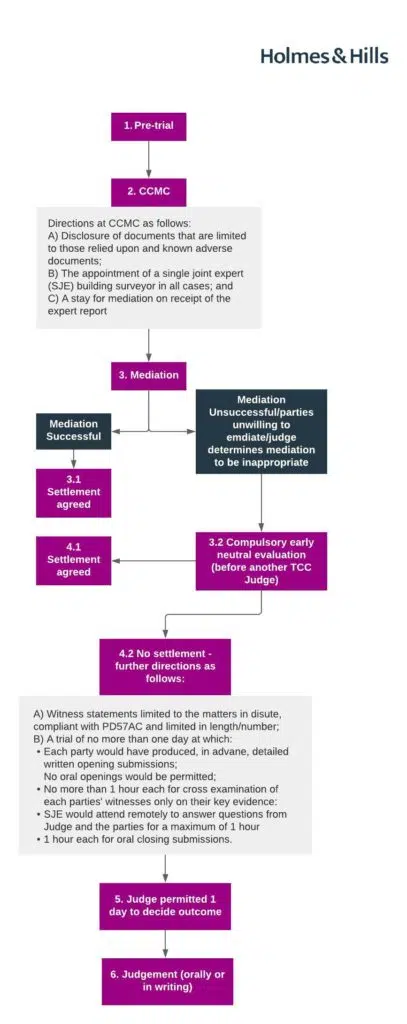Sam Bawden, specialist construction solicitor, and trainee solicitor Chrissie Parkes, specialist construction solicitors at Holmes & Hills, discuss residential building disputes and whether there might be a better way to resolve these.
Residential building disputes between homeowners and their builders are unfortunately all too common, usually centred on the value of a bill or quality of completed building works, or often both. Such disputes frequently result in the parties becoming embroiled in protracted (and expensive) litigation both fuelled by a sense of injustice and difficulties achieving a compromise. But at what cost? Significantly diminished finances, the physical and mental impact of sustaining a lengthy sparring battle through the legal system, and soured relations. In The Sky’s the Limit Transformations Ltd v Dr Mohamed Mirza [2022] EWHC 29 (TCC), HH Judge Stephen Davies proposes a schedule for resolving domestic building disputes that attempts to mitigate the excessive costs and limit the enduring conflict inherent in litigation.
The case involved a dispute between a homeowner (Dr Mirza) and a contractor (The Sky’s the Limit) over a final account of over £120,000 consisting of outstanding invoices and damages for loss of profit. HH Judge Davies was tasked with deciding upon two principal disputes: 1) whether the contract was for a fixed price quotation or an estimate (to which the Judge held the contract to be the former); and 2) what was the correct interpretation of the contractual terms regarding interim valuations and payments? The trial took place over 5 days with a somewhat challenging timetable attributable to the incorporation of the reports of 8 experts comprised of building surveyors, mechanical and electrical engineers, and quantity surveyors. After an onerous trial process, and almost a week of mostly arguing the toss, the parties were left with a rather underwhelming result. It was held that nothing further was due to the contractor and, in the absence of a counterclaim, nothing was due to the defendant either.
Disappointed with the excessive costs incurred by the parties in this matter, HH Judge Davies made a rather comprehensive proposal for future domestic building disputes aimed at lessening the financial impact of litigation. His proposed schedule is illustrated in the below diagram.

HH Judge Davies proposes several mechanisms at stages 1 - 3 aimed at circumventing the trial process (stage 4). Most significantly, at stage 2 (CCMC), the appointment of a single joint expert (SJE) allows the parties an opportunity to settle the dispute with the benefit of an impartial expert opinion.
There is a further and final opportunity to avoid Court at stage 3(ii) with a neutral evaluation by an alternative TCC Judge. The idea being that, should the Judge at this stage recommend that settlement would be far more advantageous to the respective parties than proceeding to trial, this would put a halt to the dispute continuing any further. Should the dispute progress to a trial, HH Judge Davies suggests protecting against a prolonged trial by placing a restriction on the trial of no more than one day in length.
HH Judge Davies’ final suggestion is that the respective costs of the parties should be capped at £25,000 comprising the following costings: £2,500 for disclosure; £5,000 for expert evidence; £5,000 for mediation; £2,500 for witness statements; & £10,000 for the pre- & post-trial process.
As highlighted by HH Judge Davies, the proposed schedule does not protect the parties against incurring substantial pre-action costs. However, he does go on to suggest that, if so inclined, a judge could record any disproportionate costs in the cost management order to “assist in concentrating minds”.
The idea of a cap on costs has the advantage of both levelling the playing field and ensuring that the dispute does not leave each party in significant financial disarray. However, whether a cap of £25,000 is achievable or even realistic would certainly require further examination.
There is considerable merit to HH Judge Davies’ suggestions for a more efficient and inexpensive process for domestic building disputes. However, instead of implementing a new procedure, should statutory adjudication simply be extended to include residential dwellings? At present, the right to adjudicate under the “Construction Act” 1996 does not apply to domestic construction contracts. Nevertheless, the TCC in ICCT Ltd v Sylvein Pinto ([2019] EWHC 2134 (TCC)) held that, should adjudication be permitted under the contract, then adjudication would indeed be acceptable in such circumstances.
Thus, adjudication is not necessarily out of bounds to a homeowner; but should it be even more accessible under the Act? Perhaps with more tailored guidelines as well as the additional requirement for a SJE to be appointed (as proposed by HH Judge Davies), amalgamating the speed of adjudication with the impartiality of a neutral expert, this would be entirely plausible. Putting aside what the appropriate solution is to resolve such disputes, this case highlights that there is a clear need for effective discussions about the future of construction litigation where one party is a homeowner. Specifically, the streamlining of homeowner disputes to prevent long-winded and costly litigation. Perhaps HH Judge Davies’ proposal is an adequate resolution for such matters or in the very least, a good starting point for regulating this aspect of construction law.
Until such time as any changes are brought into force, residential occupiers involved in domestic building disputes will continue to be faced with a difficult path through potentially costly Court proceedings. Obtaining expert advice from experienced construction solicitors, at the earliest stage possible, will continue to be invaluable to the parties. Armed with such advice, parties will be able to make informed decisions about which strategy to pursue to obtain an early and cost-effective resolution.






A Mackman Group collaboration - market research by Mackman Research | website design by Mackman